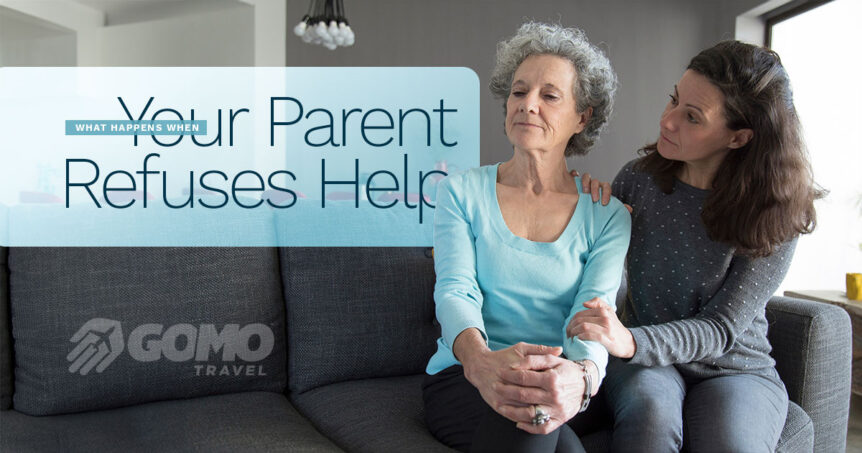“I’ve been traveling just fine for 70 years, thank you very much.”
If you’re the adult child of an aging parent, you’ve probably heard some variation of this declaration. Maybe it came after you suggested they shouldn’t be driving anymore, or when you offered to book them a wheelchair at the airport. Perhaps it was when you mentioned that their upcoming surgery might require special travel arrangements.
The frustration is real on both sides. You see genuine safety concerns, while your parent sees an attack on their independence. Understanding the psychology behind this resistance isn’t just about winning an argument—it’s about keeping your loved one safe while preserving their dignity.
The Deeper Fear Behind “I Don’t Need Help”
When seniors resist travel assistance, they’re rarely being difficult for the sake of it. Independence represents something much deeper than convenience—it’s often their last vestige of control in a world where they’ve already lost so much.
Consider what many seniors have already surrendered: perhaps they’ve given up driving, handed over financial decisions, or moved from their longtime home. Travel might represent one of their final autonomous choices. When we suggest they need help, we’re inadvertently threatening this precious independence.
Research published in The Gerontologist confirms that older adults’ perspectives on independence are deeply tied to their sense of identity and autonomy, making resistance to help a natural psychological response rather than mere stubbornness. The fear of losing independence often stems from three core concerns: loss of identity, fear of being burdensome, and terror of admitting vulnerability. These aren’t character flaws—they’re deeply human responses to aging.
The Cost of Stubborn Independence
While we must respect our parents’ desire for autonomy, the risks of unsupervised travel for vulnerable seniors are very real. According to the CDC, there were 43 emergency department visits per 100 persons aged 60 and over between 2014-2017, with rates increasing significantly with age. Medical emergencies during travel can escalate quickly, and cognitive changes that aren’t apparent at home become magnified in unfamiliar environments.
Last year, emergency departments nationwide treated thousands of seniors who experienced complications while traveling alone. Many of these situations could have been prevented with proper support, but families often don’t know how to bridge the gap between safety and independence.
Reframing Help as Empowerment
The key to overcoming resistance lies in changing the conversation entirely. Instead of focusing on what your parent can’t do, emphasize what professional travel support enables them to do. Reframing the conversation so it is focused on your parent’s healthspan is beneficial not only to your parent, but to you as well!
Start with Goals, Not Fears
Ask questions like: “Where would you like to visit that you’ve been putting off?” or “What’s stopping you from taking that trip to see your grandchildren?” Often, seniors have already self-limited their travel due to unspoken concerns or simply from being stuck in their own routine.
Present Options, Not Ultimatums
Rather than saying “You can’t travel alone anymore,” try “Let’s explore ways to make travel more comfortable for you.” This subtle shift puts them back in the decision-making seat.
Emphasize Expertise Over Necessity
Professional medical travel companions aren’t just helpers—they’re specialists who can navigate complex situations that even experienced travelers find challenging.
The Professional Companion Advantage
This is where services like GOMO Travel transform the conversation entirely. Rather than family members taking on the role of “enforcers,” professional companions become enablers of independence.
GOMO’s medical travel services are staffed by registered nurses who understand both the medical complexities and the psychological needs of senior travelers. They’re trained to provide support while maintaining the traveler’s sense of agency and dignity.
For families dealing with resistance, this professional approach often succeeds where family discussions fail. When a conversation shifts from “Mom, you need help” to “Mom, this service would give you more freedom to travel safely,” the dynamic changes completely.
Making the Transition Successful
When your parent finally agrees to try professional travel assistance, the first experience is crucial. Choose a service that prioritizes relationship-building and understands the sensitivity of the situation.
GOMO Travel’s companions are specifically trained in the psychology of senior independence. They know how to provide necessary support while allowing the traveler to maintain control over decisions and preferences. This isn’t about taking over—it’s about being available when needed while staying invisible when not.
For complex situations like senior relocation, where emotions run particularly high, having a professional mediator can transform what might be a traumatic experience into a supported transition.
The Gift of Continued Adventure
Ultimately, the goal isn’t to take away your parent’s independence—it’s to preserve it for as long as possible. Professional travel support can extend the years of safe, enjoyable travel rather than cut them short.
When framed properly, accepting help becomes an act of wisdom rather than surrender. It’s choosing to travel smartly so they can continue traveling freely. And that’s a choice that honors both their independence and your peace of mind.
Because the alternative—staying home out of fear or pride—isn’t really independence at all.
